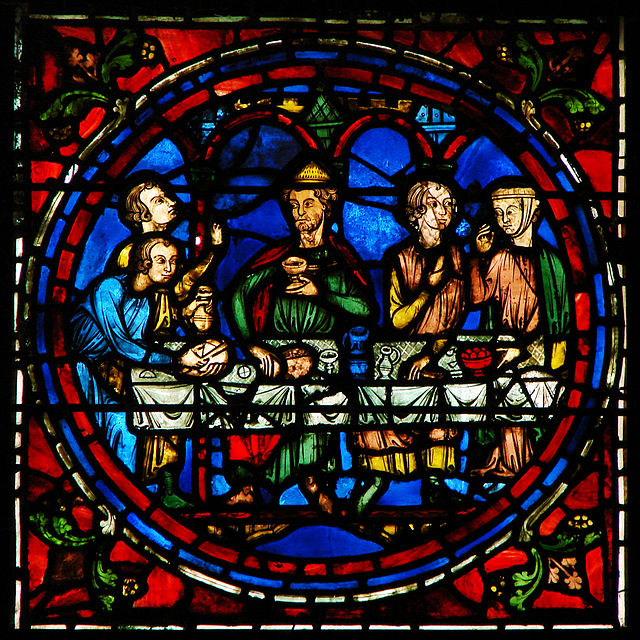Franciscan Friar Fr. Paul Gallagher reflects on the Gospel text for the Second Sunday of Ordinary Time. Who would you list among your heroes?
The content is edited by Franciscan Sister of Christian Charity Sister Anne Marie Lom and Joe Thiel. The excerpts from the Sunday readings are prepared by Joe Thiel. To read or download the complete pdf with excerpts for your prayer, please click here Franciscan Gospel Reflection January 14 2024 Excerpts are from the Lectionary for Mass for Use in the Dioceses of the United States of America, second typical edition © 2001, 1998, 1997, 1986, 1970 Confraternity of Christian Doctrine, Inc., Washington, DC. Used with permission. All rights reserved. No portion of this text may be reproduced by any means without permission in writing from the copyright owner. Photos: Micheletb, CC BY-SA 4.0 <https://creativecommons.org/licenses/by-sa/4.0>, via Wikimedia Commons; Vassil, Public domain, via Wikimedia Commons.
John 1:35-42
The next day John was there again with two of his disciples, and as he watched Jesus walk by, he said, “Behold, the Lamb of God.” The two disciples heard what he said and followed Jesus.
Jesus turned and saw them following him and said to them, “What are you looking for?” They said to him, “Rabbi” (which translated means Teacher), “where are you staying?” He said to them, “Come, and you will see.” So they went and saw where he was staying, and they stayed with him that day. It was about four in the afternoon.
Andrew, the brother of Simon Peter, was one of the two who heard John and followed Jesus. He first found his own brother Simon and told him, “We have found the Messiah” (which is translated Christ). Then he brought him to Jesus. Jesus looked at him and said, “You are Simon the son of John; you will be called Cephas” (which is translated Peter).
Background:
John’s gospel is different from Matthew, Mark, and Luke in a number of ways. For example, the gospels of Matthew, Mark, and Luke all record that it is Jesus who first invites the disciples to become his followers (Matthew 4:18-22, Mark 1:16-20, Luke 5:1-11). But here in this text it is John the Baptist who suggests that his disciples follow Jesus. Those disciples then recruit others to investigate the possibility that Jesus might be the long-awaited messiah. Jesus then changes the name of Simon to Cephas when he accepts him as a disciple. The other gospels record Jesus changing Simon’s name to Peter after he has been a disciple for some time.
In the gospel text, John presents a pattern for how people come to Jesus.
- a believer tells another of Jesus
- a title is used
- the person is led to Jesus
- Jesus sees and confirms the person’s decision
- the conversion is sealed
Because John’s gospel is believed to have been written about 100 AD or later, a similar pattern would have been true for everyone in John’s community. None of them would have had a personal experience of Jesus as he taught in synagogues, preached to the crowds, taught his followers to pray, or argued with the religious leaders. No doubt some of the early Christians lamented not having had firsthand experience of being present when Jesus walked their roads and preached in their gathering places. Others might have even used it as an excuse for not being able to believe at all. For the early Christians to point to examples where the first disciples were led to Jesus by others would diminish the credibility of those kind of objections.
Reflection Questions:
- Who would you list among your heroes?
- In what ways have any of them shaped how try to live your life?
- To what extent do you know these woman and men? Do you know any of them personally? Have you read how their life unfolded?
- Who were the people who taught you about Jesus? Who are the people who taught you how to live as a disciple? Are they the same persons?
- Do you ever wish that you had lived during the lifetime of Jesus?
- Place yourself in this gospel. See yourself as one of John the Baptist’s disciples who hear John the Baptist say “Behold, the Lamb of God.” What happens within you as you hear this statement? How does the scene unfold in your mind’s eye?
- Can you talk to God about your desire to be welcomed into God’s presence, or about the desire and the fear that arises within you from that kind of intimacy?




Article Comments:
Fr. Placid Stroik, OFM 01/11/2024 @ 8:09 pm
often this happens with Christmas correspondence ” to come and see.” one among many like this one:
a woman, wife, mother of 12, nurse, secular Franciscan, care giver in her home with one who is in need of total care. hard to improve on “what we see when we come and see” it remains and keeps on remaining.
Fr. Placid Stroik, OFM 01/13/2024 @ 10:50 pm
come and see the promise unfolding….gives me energy to listen, hear and act and always more comes. no end to what Jesus does.